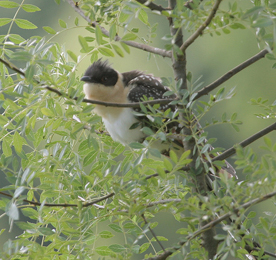| |



 
|
Current research
Brood parasites and cooperative hosts
Brood parasites are birds that lay their eggs in the nests of other species (the "hosts"), and have their offspring raised by the host parents. In some parasitic species (such as the Common cuckoo Cuculus canorus) the newly hatched chick expels all other eggs and chicks from the nest and so avoids competition for food. Chicks of other parasitic species (like the Great-spotted cuckoo Clamator glandarius) don't do so and are raised alongside the host chicks.
In evolutionary time spans, some
hosts have evolved defences against
the brood parasites, as for example
the ability of recognizing and ejecting foreign eggs, and aggressive behaviour towards parasitic adults in the proximity of the nest in order to reduce laying opportunities. In response to these defences, brood parasites have
counter-evolved strategies to "fool"
the host into accepting alien egg, as
for example improvement of resemblance between parasitic and host eggs, or reduction of laying time. When parasitic chicks hatch, they also show amazing adaptations to stimulate host parents
in feeding them at high frequencies, sometimes much higher that the hosts would have done with their own brood. |
 |
Such co-evolutionary interactions between parasites and hosts have been studied for long time in biparental host species, where only the breeding pair cares for the offspring. However, much less is known about cooperatively breeding hosts, where more than two individuals provision the nestlings. How does group size affect parasitism rate? Do parasites prefer nests of unassisted pairs or cooperative groups to lay their eggs in? Do larger groups defend better the nest against brood parasites? Do parasitic chicks grow better in nests with helpers? We are now trying to answer these questions by investigating the interactions between cooperative carrion crows and their brood parasite, the Great-spotted cuckoo.
Social environment, cooperation and cognition
Recent investigation on different corvid species has revealed surprisingly advanced cognitive abilities that sometimes rival those of non-human primates. Corvids proved to be able to solve novel problems by using their memory on previous experience, their learning capability and their ability to create innovations. Furthermore, in some species (such as western jays Aphelocoma californica and ravens Corvus corax), the individuals proved to possess the "theory of mind", that is the ability of attribute mental states and intentions to other individuals, and to modify their own behaviour according to the intentions attributed to others.
Sociality is though to be a key factor promoting the evolution of intelligence, which appears to be more advanced in species that live in stable groups. However, the adaptive function of intelligence in these species is not yet clear, as it is not fully known how these cognitive abilities are used in nature, what kind of problems they contribute to solve, and how they influence individual decisions in a changing social environment.
We intend to address questions about social environment, cognitive abilities, adaptive function of intelligence and cooperative solution of problems in carrion crows, which are known as extremely intelligent birds and also show a natural plasticity in social behaviour. To do so, we are studying social groups of crows kept in captivity.
This study is funded by the European Foundation of Science as part of the international Eurocores project "Cooperation in Corvids" in collaboration with other six universities: Viena (Austria), Cambridge (UK), Roma (Italy), Strasbourg (France), Tilburg (Holland), Vermont (USA). In this project, biologists, primatologists, and economists combine studies on ethology, evolutionary ecology, theoretic economy and robotics in order to explain the evolutionary processes and the cognitive mechanisms favouring cooperation in corvid species that show different social organizations. This international project belongs to a general investigation framework on cooperation and commerce that represents the general topic of the TECT European program.
|
| |





